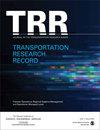Numerical Analysis of Error From Sampling of Alternatives in Logit-Based Demand Forecasting Models with Massive Choice Sets
IF 1.8
4区 工程技术
Q3 ENGINEERING, CIVIL
引用次数: 0
Abstract
Use of the multinomial logit (MNL) functional form is widespread in transportation and land use demand modeling. As the state-of-the-art evolves away from aggregate forecasting and toward activity-based models and microsimulation, MNL models are being asked to accommodate increasingly large choice sets. Different strategies exist to address the challenge of estimating models with very large choice sets, but perhaps none is as commonly employed as sampling of alternatives. The effect of sampling of alternatives on parameter estimation has received considerable attention in the scientific literature. Yet comparatively little quantitative research exists that examines the issues that arise when the same sampling strategies are applied in the context of forecasting. In this study we conducted an analysis of the effect of sampling of alternatives in discrete choice models for disaggregate location choice forecasting. First, a novel measure of forecast error was defined and then used to quantify the extent of the problem as a function of sample rate, model error, and size of the universe of alternatives. Finally, we explored the potential for strategic sampling techniques to reduce the error observed under simple random sampling. In general, we found that the proportion of aggregate demand that was misallocated owing to sampling of alternatives was actually reduced as the size of the universe of alternatives increased. Additionally, simple random sampling was shown to outperform importance sampling in most scenarios. These findings suggest that error resulting from random sampling of alternatives is less of a problem for logit-based microsimulation models than previously assumed.基于logistic的海量选择集需求预测模型中备选方案抽样误差的数值分析
多项logit (MNL)函数形式在交通和土地利用需求建模中得到了广泛的应用。随着最先进的技术从总体预测向基于活动的模型和微观模拟发展,MNL模型被要求适应越来越大的选择集。存在不同的策略来解决具有非常大的选择集的估计模型的挑战,但也许没有一个像选择抽样那样常用。在科学文献中,选择抽样对参数估计的影响受到了相当大的关注。然而,相对而言,很少有定量研究审查在预测中应用相同的抽样策略时所产生的问题。在本研究中,我们对离散选择模型中选择抽样的影响进行了分析。首先,定义了一种新的预测误差度量,然后将问题的程度量化为样本率、模型误差和备选方案范围的函数。最后,我们探索了策略抽样技术的潜力,以减少在简单随机抽样下观察到的误差。总的来说,我们发现,由于选择抽样而导致的总需求错配比例实际上随着选择范围的增大而减小。此外,在大多数情况下,简单随机抽样被证明优于重要性抽样。这些发现表明,随机抽样产生的误差对基于逻辑的微观模拟模型的影响比以前假设的要小。
本文章由计算机程序翻译,如有差异,请以英文原文为准。
求助全文
约1分钟内获得全文
求助全文
来源期刊

Transportation Research Record
工程技术-工程:土木
CiteScore
3.20
自引率
11.80%
发文量
918
审稿时长
4.2 months
期刊介绍:
Transportation Research Record: Journal of the Transportation Research Board is one of the most cited and prolific transportation journals in the world, offering unparalleled depth and breadth in the coverage of transportation-related topics. The TRR publishes approximately 70 issues annually of outstanding, peer-reviewed papers presenting research findings in policy, planning, administration, economics and financing, operations, construction, design, maintenance, safety, and more, for all modes of transportation. This site provides electronic access to a full compilation of papers since the 1996 series.
 求助内容:
求助内容: 应助结果提醒方式:
应助结果提醒方式:


